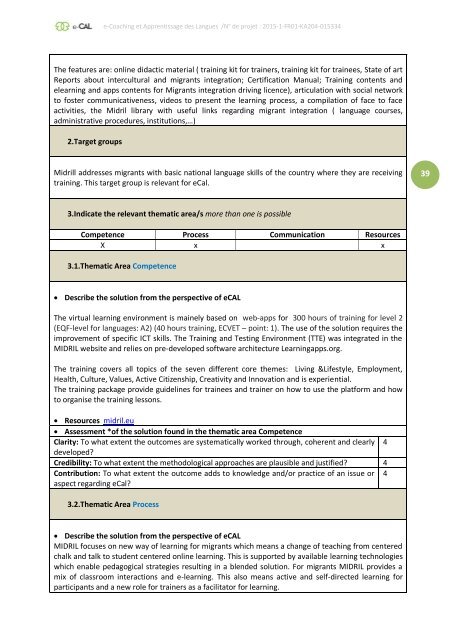e-CAL - e-Coaching et Apprentissage des Langues
The ERASMUS+ project e-CAL presents the result of an analysis of support methods in the case of language learning using web-based Open Educational Resources (OER).
The ERASMUS+ project e-CAL presents the result of an analysis of support methods in the case of language learning using web-based Open Educational Resources (OER).
Create successful ePaper yourself
Turn your PDF publications into a flip-book with our unique Google optimized e-Paper software.
e-<strong>Coaching</strong> <strong>et</strong> <strong>Apprentissage</strong> <strong>des</strong> <strong>Langues</strong> /N° de proj<strong>et</strong> : 2015-1-FR01-KA204-015334<br />
The features are: online didactic material ( training kit for trainers, training kit for trainees, State of art<br />
Reports about intercultural and migrants integration; Certification Manual; Training contents and<br />
elearning and apps contents for Migrants integration driving licence), articulation with social n<strong>et</strong>work<br />
to foster communicativeness, videos to present the learning process, a compilation of face to face<br />
activities, the Midril library with useful links regarding migrant integration ( language courses,<br />
administrative procedures, institutions,…)<br />
2.Targ<strong>et</strong> groups<br />
Midrill addresses migrants with basic national language skills of the country where they are receiving<br />
training. This targ<strong>et</strong> group is relevant for eCal.<br />
39<br />
3.Indicate the relevant thematic area/s more than one is possible<br />
Comp<strong>et</strong>ence Process Communication Resources<br />
X x x<br />
3.1.Thematic Area Comp<strong>et</strong>ence<br />
Describe the solution from the perspective of e<strong>CAL</strong><br />
The virtual learning environment is mainely based on web-apps for 300 hours of training for level 2<br />
(EQF-level for languages: A2) (40 hours training, ECVET – point: 1). The use of the solution requires the<br />
improvement of specific ICT skills. The Training and Testing Environment (TTE) was integrated in the<br />
MIDRIL website and relies on pre-developed software architecture Learningapps.org.<br />
The training covers all topics of the seven different core themes: Living &Lifestyle, Employment,<br />
Health, Culture, Values, Active Citizenship, Creativity and Innovation and is experiential.<br />
The training package provide guidelines for trainees and trainer on how to use the platform and how<br />
to organise the training lessons.<br />
Resources midril.eu<br />
Assessment *of the solution found in the thematic area Comp<strong>et</strong>ence<br />
Clarity: To what extent the outcomes are systematically worked through, coherent and clearly 4<br />
developed?<br />
Credibility: To what extent the m<strong>et</strong>hodological approaches are plausible and justified? 4<br />
Contribution: To what extent the outcome adds to knowledge and/or practice of an issue or 4<br />
aspect regarding eCal?<br />
3.2.Thematic Area Process<br />
Describe the solution from the perspective of e<strong>CAL</strong><br />
MIDRIL focuses on new way of learning for migrants which means a change of teaching from centered<br />
chalk and talk to student centered online learning. This is supported by available learning technologies<br />
which enable pedagogical strategies resulting in a blended solution. For migrants MIDRIL provi<strong>des</strong> a<br />
mix of classroom interactions and e-learning. This also means active and self-directed learning for<br />
participants and a new role for trainers as a facilitator for learning.


